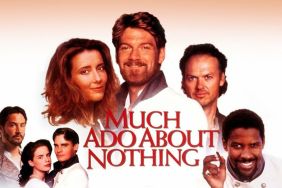Cast:
Amy Acker as Beatrice
Alexis Denisof as Benedick
Nathan Fillion as Dogberry
Clark Gregg as Leonato
Reed Diamond as Don Pedro
Fran Kranz as Claudio
Sean Maher as Don John
Spencer Treat Clark as Borachio
Riki Lindhome as Conrade
Ashley Johnson as Margaret
Emma Bates as Ursula
Tom Lenk as Verges
Nick Kocher as First Watchman
Brian McElhaney as Second Watchman
Joshua Zar as Leonato’s aide
Paul Meston as Friar Francis
Romy Rosemont as the Sexton
Jillian Morgese as Hero
Review:
It has been said that the works of William Shakespeare are so excellent and universal they can be recast into any time and setting and still work with the same efficiency and power as they did on the original London stage. I maintain that until someone does a really good porn version that is in dispute, but people are still trying, with varying degrees of success.
The latest attempt is writer-director Joss Whedon’s (“The Avengers”) take on one of Shakespeare’s most famous comedies, “Much Ado About Nothing.” A story of contrasts, “Ado” is a light hearted comedy of errors built around a melancholy core. The film follows the attempts of a group of Italian noblemen to trick their friends and relatives Beatrice (Amy Acker) and Benedick (Alexis Denisoff) to stop fighting and realizing they still love each other during long weekend.
Shot in just 12 days in Whedon’s on home, this version of “Ado” strips away the pomp and circumstance most big screen versions of Shakespeare try for, producing a spare version even by most theatrical standards. Gone are the trappings of middle ages Italy, replaced by the trappings of modern life. Gone too is the classic iambic pentameter of Shakespearean delivery in lieu of a more modern sound and feel again, though the old words remain. Gone even is the color, in favor of old school black and white (albeit digitally captured).
What we’re left with then are the characters themselves: happy but hurt Beatrice who can’t help but heap scorn on the proud, cynical man who left her even if she doesn’t really want to. Alongside them come Don Pedro (Reed Diamond) and Prince Claudio (Fran Kranz), Benedick’s brothers in arms.
And Don Pedro’s scheming brother John (Sean Maher-a revelation as a bad guy), one of Shakespeare’s few black and white villains with little complexity to shade him, a fact he actually reveals at in soliloquy. John and his henchmen scheme to ruin the marriage between Claudio and Beatrice’s cousin Hero (Jillian Morgese) just because they can and suddenly all the pratfalls and mistaken identity takes a very serious turn.
With so much of the regular business of a film adaptation removed, Whedon’s “Ado” has been left to survive entirely on the backs of its actors, and that is both its greatest success and its Achilles heel.
Because the real joy of this version are the little guys–from John’s henchmen to the maids of the household to Leonato’s (Clark Gregg) publicity guy–they all take advantage of delightful small moments to fill Shakespeare’s words and Whedon’s film with soul.
The biggest of those little guys (literally) and the reason to watch “Ado” at all is Nathan Fillion’s Constable Dogberry. Portrayed as cartoonish version of a bad TV cop, completely unaware of his own buffoonery, Fillion steals every scene he is in and proves even the bard’s old language is still hilarious when delivered right. It helps that he is backed up a fantastic crew of fellow watchmen, who together make the film’s most memorable moments.
The downside is that the leads can’t quite keep up and it shows. Acker is amiable enough though she is much better at showing Beatrice’s good side than her bad. It is Denisof who is the real anchor around “Ado’s” neck, delivering every line in a strange flat accent that makes him sound like a game show host. It is distracting and impossible to take him serious as a romantic lead.
It’s not enough of an anchor, thankfully, to drown “Ado.” Whedon has directed his film with style and skill, for all the lack of additives to it, even offering modern updates to Shakespeare’s original songs from the play.
As a modern version of Shakespeare goes, “Ado” has a lot to recommend it and is worth seeing for Fillion’s performance alone. Ultimately the speed with which it was made, and the seams that come with that, do show a little in particular with the two leads. Yeah, you can do great stuff with little fun projects like this, but it’s hard not to show your origins off. For good or ill, “Much Ado About Nothing” proudly displays both of them.








